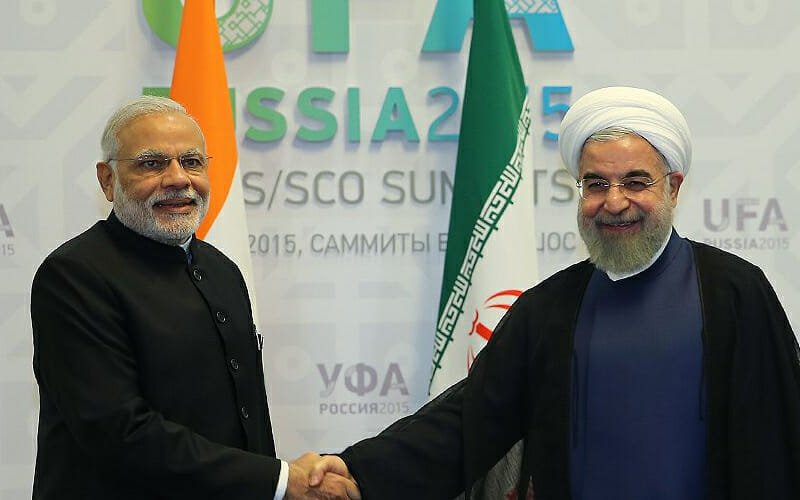
Will Killing the Iran Deal Destroy the Iran-India Economic Honeymoon?
U.S. President Donald Trump has called for new sanctions against Iran and proposed decertification of the Joint Comprehensive Plan of Action (JCPOA), popularly known as the Iran Deal.
Trump has given the European signatories to the agreement, most importantly Britain, Germany and France, an ultimatum to fix the flaws in the Iran deal or forget about the United States’ continued investment in the agreement, which according to Trump, was Obama’s deal and one of the most disastrous and one-sided accords the U.S. has ever entered into.
Terms and conditions of the JCPOA are clear. In a nutshell, Iran rolls back certain aspects of its ambitious nuclear programme, sticks to its technical commitments under the Nuclear Non-Proliferation Treaty and enjoys sanctions relief and reconnection to the international banking and financial system.
Iran and India: days of economic honeymoon
At the conclusion of the nuclear deal in July 2015, which many believe was Barack Obama’s signature foreign policy achievement, the U.S., the European Union and the United Nations started to remove the sanctions that had left Iran’s economy in limbo: economic restrictions that cost the country more than $160 billion in oil revenues from 2012 to 2016 alone and blocked its access to more than $100 billion in foreign assets overseas.
Iran’s economy began to rise from the ashes again and an array of countries which had been shunning their formerly close economic partner restarted their trade transactions with Tehran.
India has traditionally been one of Iran’s major trading partners and a regular customer for the Persian Gulf nation’s oil. In 2016, India was the second main destination for Iranian exports and the eighth largest exporter of goods to Iran. Aside from political and diplomatic relations, which have always been maintained reasonably and robustly, as manifested in the regular visits paid by the two presidents to the two capitals, MIT’s Observatory of Economic Complexity shows that 18% of Iran’s exports go to India while 7.1% of its imports come from India.
While enjoying the benefits of the JCPOA, Iran’s oil exports are rising to levels not seen in years. In 2017, when Iran shipped 777 million barrels of crude, India was the second largest importer of Iranian oil after China — hardly a surprise, given India’s amicable relations and the quality of Iranian oil.
Much has been said about the benefits of the Iran deal and how it benefits ordinary Iranian citizens and enhances international peace and security. In particular, the deal removes the obstacles that block the improvement of Iran-India relations and the facilitation of economic ties.
Moreover, the investment of Indian firms in the Chabahar Port in southeastern Iran on the Gulf of Oman, which is Iran’s only ocean port and a hub of trade with Russia and Europe, was hugely facilitated following the signing of the nuclear deal and Indian companies consider themselves the main stakeholders although they are in close competition with Chinese firms.
But what will happen to these jovial, smooth and apparently unopposed economic relations if the Iran deal is in any way affected adversely by an immature, thoughtless decision of President Trump?
Iran deal: “It depends…”
Iran has a poor human rights record. Its internal divisions, the inability of the government and youth to understand each other and the inefficiency of the former in addressing the day to day concerns of the latter as well as the ongoing power struggles make it vulnerable to external threats, be it the chaos in Yemen and Bahrain, Saudi Arabia’s involvement in an uneven regional power race, Israel’s intermittent threats and President Trump’s warnings that he may unilaterally withdraw from the nuclear deal at any time.
India, as a sovereign state, may face similar issues, including a problem with its Muslim minority, definable as some “human rights concerns” that are for a number of reasons overlooked. But India’s human rights record or poor governance don’t chip away at the standing of the nuclear deal. Even its nuclear weapons don’t raise eyebrows. It’s mostly the crossing of red lines by Iran that make the implementation of JCPOA and its survival difficult.
The EU has clearly expressed its commitment to the JCPOA, and made it clear that the outcome of years of negotiations and hard work done by the best diplomats of the P5+1 and Iran must not be thrown away overnight and the U.S. is an important signatory to the deal. The EU’s weight, prominence and standing cannot be ignored or underestimated.
If the Iran deal is undermined in any way, and if the U.S. goes down the path of chipping away at the substance of the document, which has contributed to peace and stability in the Middle East for some three years now and has improved living standards for Iranians for years to come, the future looks grim. Moreover, healthy trade between Iran and India might be doomed.
The Iran deal was an agreement built upon verification, not trust, as suggested by the then U.S. President Barack Obama. However, seeing Iran and the U.S. in the same boat, even on the basis of verification, is itself inspirational: two countries which have been engaged in a political “hide and seek” for four decades finally come to an agreement about something which is important and should be preserved.
Now, President Trump, whose political ineptitude and inexperience is an open secret, wants to derail a contract which is verified, working and beneficial to the global community. If he is intent upon realizing his goals about the Iran deal, there will be many losers.
Iran’s economy will lose, and as a result, 80 million people, a majority of whom are ambitious, young people under 30, who cheerfully took to the streets in July 2015 to hail and celebrate the nuclear deal, will certainly feel crushed. Iran-India commerce and business will be affected adversely and a working economic relationship which is benefiting the two countries will have to concede defeat. Overall, international diplomacy, the United Nations and its Security Council, the European Union and some of the most experienced diplomats and negotiators of the five permanent members of the Security Council plus Germany and Iran who spent countless hours to secure this vital agreement and produce an important document of 159 pages will emerge losers as will Iran-India relations, both at the- political and economic levels- all due to unwise policy decisions.

